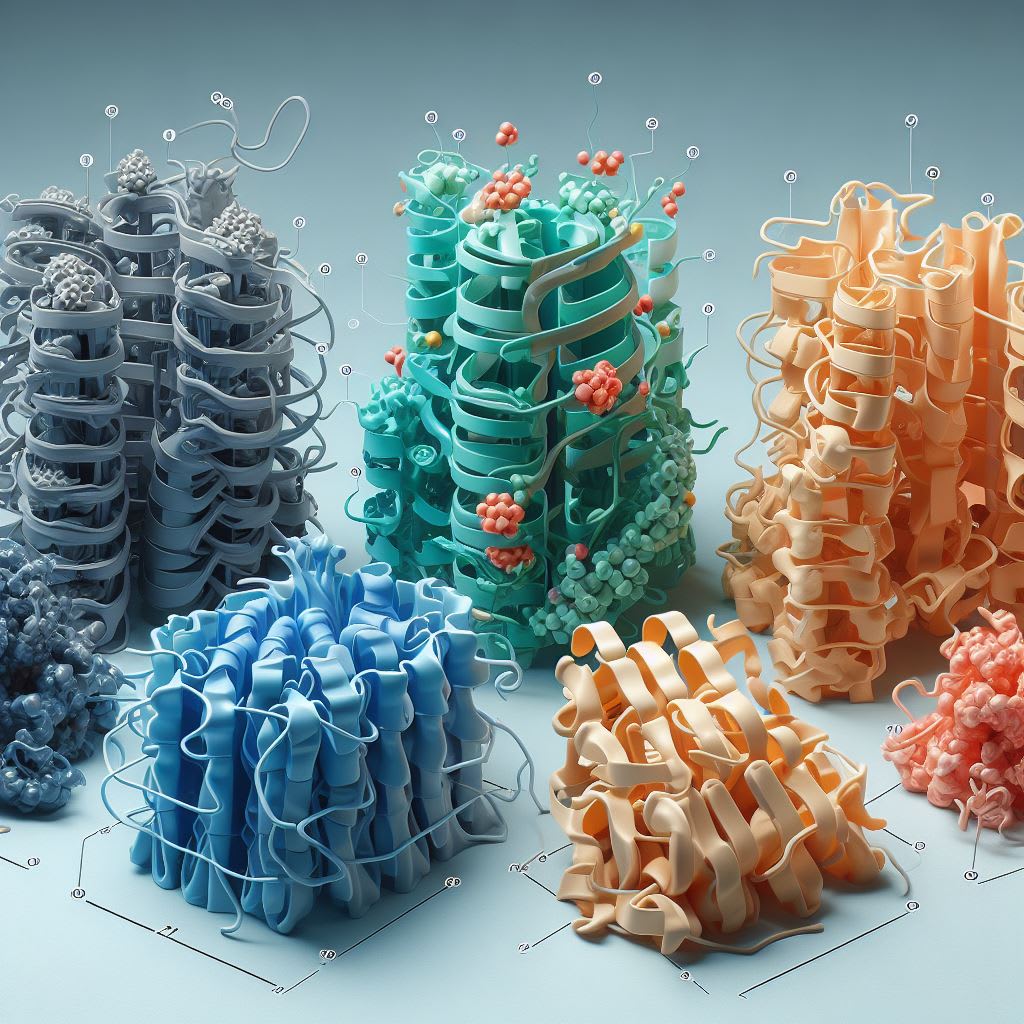How AI is Solving The Mystery of Protein Folding and Unlocking The Secrets of Life
What are proteins and why are they important?

Proteins are the building blocks of life. They are large molecules that perform various functions in living organisms, such as catalyzing chemical reactions, transporting substances, fighting diseases, and regulating genes. Proteins are made of smaller units called amino acids, which are linked together in a long chain. The order of amino acids in a protein is determined by the genetic code in DNA.
However, the function of a protein does not depend only on its sequence of amino acids, but also on its shape. The shape of a protein is determined by how the amino acid chain folds into a three-dimensional structure. The folding process is influenced by various factors, such as the interactions between amino acids, the environment, and other molecules. The shape of a protein determines how it interacts with other molecules and performs its function.
Protein folding is one of the most complex and fascinating phenomena in nature. It is also one of the most challenging problems in science. Scientists have been trying to understand how proteins fold and what their shapes are for decades, but they have only been able to solve a small fraction of them. Knowing the shape of a protein can help scientists to understand its function, design new drugs, engineer new enzymes, and discover new biological pathways.
How AI is revolutionizing protein folding research
Until recently, predicting the shape of a protein from its amino acid sequence was considered an extremely difficult task. The number of possible ways that a protein can fold is astronomical, and the experimental methods to determine the structure are time-consuming, expensive, and often unreliable. However, thanks to the advances in artificial intelligence (AI), this task has become much easier and faster.
AI is a branch of computer science that aims to create machines or systems that can perform tasks that normally require human intelligence, such as learning, reasoning, and problem-solving. AI can use various techniques, such as machine learning, deep learning, neural networks, and reinforcement learning, to analyze large amounts of data and find patterns or solutions.
One of the most successful applications of AI in protein folding research is AlphaFold, a system developed by DeepMind, a leading AI company based in London. AlphaFold uses deep learning to predict the shape of a protein from its amino acid sequence. It does so by learning from millions of known protein structures that have been collected by scientists over more than 50 years. AlphaFold then uses this knowledge to infer the most likely shape for a new protein.
AlphaFold has achieved remarkable results in predicting protein structures with high accuracy and speed. In 2020, AlphaFold participated in CASP14, a biennial competition that evaluates the performance of various methods for protein structure prediction. AlphaFold outperformed all other methods and achieved an accuracy level that was close to the experimental results. This was considered a breakthrough in the field and a milestone for AI.
How AlphaFold is revealing the structure of the protein universe
In 2021, DeepMind announced that it had used AlphaFold to predict the structure of more than 200 million proteins from about 1 million species, covering almost all known proteins on Earth. This was an unprecedented achievement that opened up new possibilities for biological research and innovation.
DeepMind made these predictions publicly available through a database called AlphaFold Protein Structure Database (AFDB), which anyone can access for free. AFDB contains detailed information about each protein structure, such as its coordinates, confidence scores, quality metrics, and annotations. AFDB also allows users to search for proteins by name, sequence, or taxonomy.
The AFDB is expected to have a huge impact on various fields of science and medicine. For example, it can help researchers to:
* Discover new proteins and their functions
* Understand how proteins interact with each other and form complexes
* Identify potential targets for drug development
* Design new proteins with desired properties or functions
* Explore the evolution and diversity of life
* Solve diseases caused by protein misfolding or malfunction

How AlphaFold is collaborating with other research institutions
DeepMind is not only using AlphaFold for its own research purposes, but also collaborating with other research institutions around the world to apply AlphaFold to specific problems or domains. Some examples of these collaborations are:
* The Drugs for Neglected Diseases initiative (DNDi), which aims to develop new treatments for neglected tropical diseases such as malaria and leishmaniasis. AlphaFold has helped DNDi to identify new drug candidates that target essential proteins in these parasites.
* The Centre for Enzyme Innovation (CEI), which focuses on engineering enzymes that can degrade plastic waste and reduce environmental pollution. AlphaFold has helped CEI to understand how enzymes work and how they can be improved or modified.
* The European Molecular Biology Laboratory (EMBL), which is a leading research organization in molecular biology and bioinformatics. AlphaFold has helped EMBL to enhance its databases and tools for protein structure analysis and annotation.
* The Francis Crick Institute, which is a biomedical research center that investigates the causes and mechanisms of diseases such as cancer, neurodegeneration, and infection. AlphaFold has helped the Crick to study the structure and function of proteins involved in these diseases and to find new ways to intervene or prevent them.
These are just some examples of how AlphaFold is contributing to the advancement of science and society. There are many more potential applications and benefits that AlphaFold can offer in the future. AlphaFold is proving that AI can crack fundamental scientific problems and unlock the secrets of life.
Sources:
- https://www.nature.com/articles/d41586-022-02083-2
- https://www.sciencenews.org/article/alphafold-ai-protein-structure-folding-prediction
- https://www.sciencedaily.com/releases/2023/09/230920111205.htm






Comments
There are no comments for this story
Be the first to respond and start the conversation.